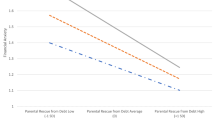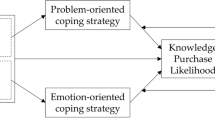Abstract
While there is growing empirical attention to the factors affecting the use of Alternative Financial Services (AFS), outcomes of use of AFS are not fully understood. We examined the relationship between AFS use and financial anxiety, with a role of financial knowledge on the association. Using the 2018 National Financial Capability Study, AFS use was measured in three different ways as follows: (1) A binary indicator whether respondents had used at least one of AFS products, (2) the number of different AFS types used, and (3) binary indicators of uses of five different types of AFS. Financial anxiety measure was constructed based on three questions regarding worry, anxious and stressed about personal finance. Regression results demonstrated that AFS use was associated with higher level of financial anxiety while financial knowledge was negatively associated with financial anxiety. Further, results indicated positive interactions between financial knowledge and AFS use, which implies that financial knowledge may increase financial anxiety among AFS users. Considering the interaction and direct effects of financial knowledge on financial anxiety, financial knowledge has a negative effect on anxiety for non-AFS users but little to no effect on anxiety for AFS users. Findings of this study have implications for consumer professionals who work with AFS users.

Similar content being viewed by others
Notes
Full results including control variables are available upon the request.
References
Agarwal, S., & Bos, M. (2014). Rationality in the Consumer Credit Market: Choosing between Alternative and Mainstream Credit. Available at SSRN: https://ssrn.com/abstract=1978574 or https://doi.org/10.2139/ssrn.1978574
Archuleta, K. L., Dale, A., & Spann, S. M. (2013). College students and financial distress: exploring debt, financial satisfaction, and financial anxiety. Journal of Financial Counseling and Planning, 24(2), 50–62.
Birkenmaier, J., & Fu, Q. (2016). The association of alternative financial services usage and financial access: evidence from the National Financial Capability Study. Journal of Family and Economic Issues, 37(3), 450–460.
Birkenmaier, J., & Fu, Q. (2018). Household financial access and use of alternative financial services in the U.S.: two sides of the same coin? Social Indicator Research, 139, 1169–1185.
Carter, S. P., & Skiba, M. (2012). Pawnshops, behavioral Economics, and self-regulation. Review of Banking & Financial Law, 32, 193–220.
Eisenberg-Guyot, J., Firth, C., Klawitter, M., & Hajat, A. (2018). From payday loans to pawnshops: Fringe banking, the unbanked, and health. Health Affairs, 37(3), 429–437.
Grable, J. E., Archuleta, K. L., Ford, M. R., Kruger, M., Gale, J., & Goetz, J. (2020). The moderating effect of generalized anxiety and financial knowledge on Financial Management Behavior. Contemporary Family Therapy, 42, 15–24. https://doi.org/10.1007/s10591-019-09520-x.
Hasler, A., Lusardi, A., & Valdes, O. (2021). Financial anxiety and stress among U.S. households: New evidence from the National Financial Capability Study and Focus Groups. Global Financial Literacy Excellence Center Report.
Huston, S. J. (2010). Measuring financial literacy. Journal of Consumer Affairs, 44(2), 296–316.
Lusardi, A., & de Bassa Scheresberg, C. B. (2013). Financial literacy and high-cost borrowing in the United States. NBER Working Paper No. 18969. http://www.nber.org/papers/w18969
Lusardi, A., & Tufano, P. (2015). Debt literacy, financial experiences, and overindebtedness. Journal of Pension Economics & Finance, 14(4), 332–368. https://doi.org/10.1017/S1474747215000232.
Kim, K. T., Lee, J., & Lee, J. M. (2019). Exploring racial/ethnic disparities in the use of alternative financial services: the moderating role of financial knowledge. Race and Social Problems, 11(2), 149–160.
Kim, K. T., Lee, J., & Hanna, S. D. (2020). The effects of financial literacy overconfidence on the mortgage delinquency of U.S. households. Journal of Consumer Affairs, 54(2), 517–540. https://doi.org/10.1111/joca.12287.
Kim, K. T., & Xiao, J. J. (2021). Racial/ethnic differences in consumer financial capability: the role of financial education. International Journal of Consumer Studies, 45(3), 379–395. https://doi.org/10.1111/ijcs.12628.
Levy, R., & Sledge, J. (2012). A Complex Portrait: An Examination of Small-Dollar Credit Consumers Center for Financial Services Innovation. http://www.cfsinnovation.com.
Lusardi, A., & Mitchell, O. S. (2014). The economic importance of financial literacy: theory and evidence. Journal of Economic Literature, 52(1), 5–44. https://doi.org/10.1257/jel.52.1.5.
Melzer, B. T. (2011). The real costs of credit access: evidence from the payday lending market. The Quarterly Journal of Economics, 126, 517–555. https://doi.org/10.1093/qje/qjq009.
Nicolini, G., & Cude, B. J. (2019). The influence of financial well-being on pawnshop use. Journal of Consumer Affairs, 53(4), 1674–1692. https://doi.org/10.1111/joca.12244.
O’Neill, B., & Xiao, J. J. (2015). Payday loan, state law, and financial capability. Journal of Financial Service Professionals, 69(6), 89–98.
Pak, T. Y. (2018). Financial literacy and high-cost borrowing; exploring the mechanism. International Journal of Consumer Studies, 42, 283–294. DOI: https://doi.org/10.1111/ijcs.12429.
Porto, N., & Xiao, J. J. (2016). Financial literacy overconfidence and financial advice seeking. Journal of Financial Service Professionals, 70(4), 78–88.
Robb, C., Babiarz, P., Woodyard, A., & Seay, M. C. (2015). Bounded rationality and use of alternative financial services. Journal of Consumer Affairs, 49(2), 407–435.
Sages, R., Britt, S., & Cumbie, J. (2013). The correlation between anxiety and money management. College Student Journal, 47(1), 1–11.
Xiao, J. J., & Kim, K. T. (2021). The able worry more? Debt delinquency, financial capability, and financial stress. Journal of Family and Economic Issues. https://doi.org/10.1007/s10834-021-09767-3.
Xiao, J. J., Chen, C., & Chen, F. (2014). Consumer financial capability and financial satisfaction. Social Indicators Research, 118(1), 415–432.
Xiao, J. J., Tang, C., Serido, J., & Shim, S. (2011). Antecedents and consequences of risky credit behavior among college students: application and extension of the theory of Planned Behavior. Journal of Public Policy & Marketing, 30(2), 239–245.
Wilson, E., & Wolkowitz, E. (2017). 2017 Financially underserved market size study. Center for Financial Services Innovation. Retrieved from https://s3.amazonaws.com/cfsi-innovation-files-2018/wp-content/uploads/2017/04/27001546/2017-Market-Size-Report_FINAL_4.pdf
Sweet, E., Kuzawa, C. W., & McDade, T. W. (2018). Short-term lending: Payday loans as risk factors for anxiety, inflammation and poor health.SSM-Population Health,114–121.
Funding
Not applicable.
Author information
Authors and Affiliations
Corresponding author
Ethics declarations
Conflict of interest
The authors declare that they have no conflict of interest.
Research Involving Human and Animal Participants.
This article does not contain any studies with human participants or animals performed by any of the authors.
Informed Consent
Not applicable.
Additional information
Publisher’s Note
Springer Nature remains neutral with regard to jurisdictional claims in published maps and institutional affiliations.
Rights and permissions
Springer Nature or its licensor (e.g. a society or other partner) holds exclusive rights to this article under a publishing agreement with the author(s) or other rightsholder(s); author self-archiving of the accepted manuscript version of this article is solely governed by the terms of such publishing agreement and applicable law.
About this article
Cite this article
Kim, K.T., Cho, S.H. & Xiao, J.J. Is Ignorance Bliss? Use of Alternative Financial Services, Financial Knowledge, and Financial Anxiety. J Fam Econ Iss 44, 956–967 (2023). https://doi.org/10.1007/s10834-022-09883-8
Received:
Accepted:
Published:
Issue Date:
DOI: https://doi.org/10.1007/s10834-022-09883-8




